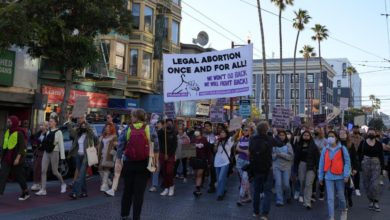 Women protest the April 18 Supreme Court decision eroding abortion rights. Photo: Scott J. Ferrell |
Before the Supreme Court passed the Roe v. Wade decision legalizing abortion in 1973, thousands of working-class women suffered injury and death each year as they sought to terminate a pregnancy. Women, deprived of the legal right to control their own bodies, became social outlaws simply for having an abortion.
Affluent women, too, suffered obstacles and hurdles. But they had financial resources and could travel to other countries where abortion was legal, or pay additional thousands of dollars to doctors to perform abortions in a safer environment.
Working-class women had no such options.
The U.S. Supreme Court has just provided us with an example of how the ruling class is trying to target women for special oppression above and beyond the oppression that all workers experience in capitalist society. The April 20 ruling that outlaws a surgical procedure to terminate a pregnancy constitutes a full-scale assault on what has been a basic gain of the women’s rights movement: the fundamental premise that it is women and women alone who have the right to determine whether or not they will have a child.
The retrograde opinion in the case known as Gonzales v. Carhart is written in paternalistic language like that used to describe women and their societal role in the 1800s.
Justice Anthony Kennedy wrote the majority opinion. Kennedy was joined in the majority by the court’s four other arch-conservative members: Clarence Thomas, Antonin Scalia, Chief Justice John Roberts and Samuel Alito.
The majority decision says that the court has the right to intervene to protect her—from herself! “The Act also recognizes that respect for human life finds an ultimate expression in a mother’s love for her child,” the majority wrote. “Whether to have an abortion requires a difficult and painful moral decision … which some women come to regret.”
In the dissenting opinion, Justice Ruth Bader Ginsburg—the court’s lone woman member—strongly stated, “this way of thinking reflects ancient notions of women’s place in the family and under the Constitution—ideas that have long since been discredited.”
This decision signals a setback for the struggle to retain reproductive rights.
The ruling itself upheld the constitutionality of a bill passed by Congress in 2003. The law at issue criminalizes the second trimester procedure known as “intact dilation and extraction”—even if a woman’s life is in danger. A doctor who performs the medical procedure would face felony charges and up to two years in prison.
At that time, 17 Democratic senators joined 47 Republicans to pass the bill. A legal challenge by Planned Parenthood and other pro-choice groups brought the case eventually to the Supreme Court.
Anti-choice bigots resort to inflammatory rhetoric like referring to the procedure as a “partial birth abortion.” The intact dilation and extraction procedure is used in less than 1 percent of all abortions for specific purposes related to a woman’s health.
But the Carhart decision is not just about one particular abortion procedure. Many states may try to pass laws to outlaw all second trimester abortions, effectively banning all abortions after the 12th week of pregnancy.
The Supreme Court decision has emboldened right-wing anti-choice forces. The week following the decision, North Dakota’s legislature passed a law that would ban virtually all abortions. The Missouri House voted to tighten regulation of abortion clinics. Two federal appeals courts were asked to lift injunctions blocking enforcement of state abortion bans. Operation Rescue made a request the same week to the Kansas attorney general to begin enforcing a ban that has been on the books.
The National Organization for Women issued a statement condemning the decision. But they announced to the millions of women outraged by the decision that the only way to guarantee the maintenance of women’s rights would be to elect a Democratic president in 2008.
If this was the outlook of people who fought for Roe v. Wade in the first place—or who fought for women’s rights, for LGBT rights, for civil rights—we would have no rights whatsoever.
Mass struggle won women’s rights—and can defend them
Roe v. Wade was passed in 1973 under the Nixon administration by a court stacked with Republican judges. Every credible history shows that the court issued the Roe v. Wade decision under massive pressure from the streets. It was the historic social uprising of women that so altered the political climate that the ruling class in this country decided it was better to give women at least some rights rather than risk the prospect of growing social unrest.
This has been true of every gain won in the struggle of oppressed peoples.
If we won the rights that are under attack now with a mass movement of the people, then it will not be anything other than the mass movement of the people that can defend these rights.
If we learn the lesson of history, every right that was won can be defended and the rights that have never been won can still be achieved.






